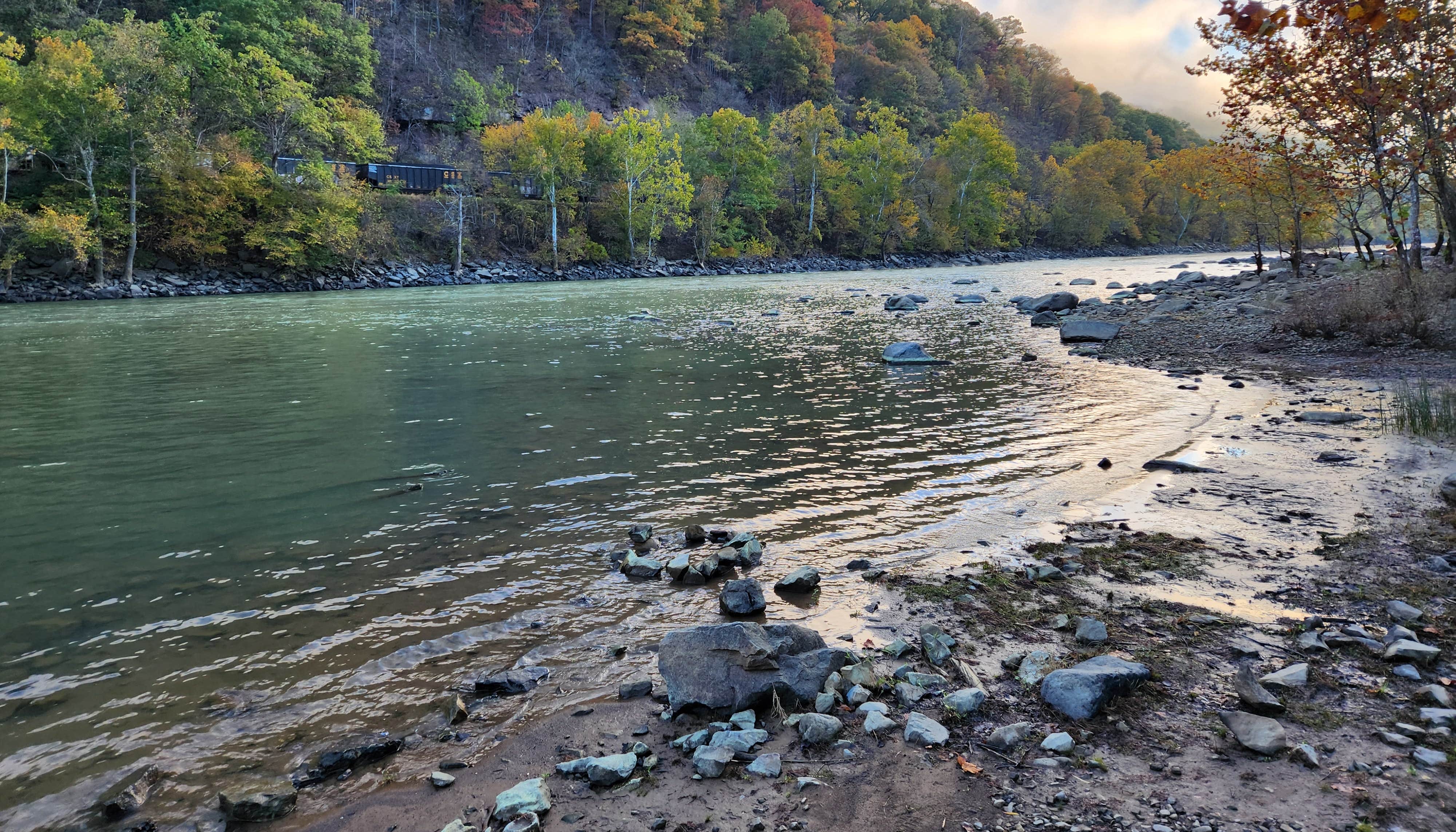New River Gorge National Park and Preserve Camping Guide
New River Gorge National Park and Preserve became one of America's newest national parks in 2020, and its camping experience remains refreshingly rugged. New River Gorge NP offers 8 free, first-come, first-served campgrounds tucked along the New River's wooded banks and ridgetops. These are primitive sites -- no drinking water, no hookups, and only vault toilets -- so campers should come prepared to be self-sufficient. What you sacrifice in amenities, however, you gain in solitude and scenery: from riverside sandbars perfect for fishing to quiet mountaintop clearings alive with night stars. Surrounding the park, West Virginia's state parks and private campgrounds provide more developed camping alternatives for those who need extra facilities. This comprehensive guide will cover all eight in-park campgrounds at New River Gorge, compare their features, highlight nearby adventures (from famous whitewater rafting trips to scenic trails), and offer tips on planning a safe and enjoyable camping trip in Almost Heaven West Virginia.
New River Gorge National Park Camping at a Glance
All New River Gorge campgrounds now operate on a first-come, first-served basis year-round, with no reservations accepted at any park campground. Sites range from riverside tent-only spots to drive-in sites accommodating small RVs. For those seeking different camping experiences, the area also offers excellent New River Gorge NP dispersed camping options, RV-friendly campgrounds nearby, and unique glamping experiences for those wanting outdoor adventure with more comfort.
New River Gorge National Park Campground Quick Facts
| Quick Facts | Details |
|---|---|
| Number of Campgrounds | 8 primitive campgrounds (within park) totaling ~75 sites; plus 1 additional campground in adjacent Gauley River NRA |
| Camping Fees | $0.00 -- All sites are free of charge |
| Reservations | Not accepted -- first-come, first-served only (arrive early on busy weekends) |
| Camping Season | Year-round; access roads are gravel/dirt and may be muddy or occasionally snow-covered in winter |
| Amenities | No potable water or hookups; vault toilets and picnic tables at most campgrounds |
| RV/Trailer Access | Drive-in sites accommodate small RVs/trailers (generally under 25 ft); no RV hookups; some campground roads are narrow and steep |
| Nearest Services | Gas, groceries, and supplies in nearby towns (Fayetteville, Oak Hill, Beckley, Hinton); none available inside park |
New River Gorge Campgrounds: Complete Guide
New River Gorge's campgrounds are primitive and spread out along roughly 53 miles of river. Seven of the eight campgrounds sit beside the New River itself, while one (War Ridge) rests on a remote ridgetop. All sites have a picnic table and fire ring or grill. There is no cell service at most campgrounds, and with no lights around, nights are very dark -- perfect for stargazing but be sure to bring a good flashlight or headlamp. Below, we group the campgrounds by area, with details on what to expect at each site.
Northern New River Gorge Campgrounds (Thurmond Area)
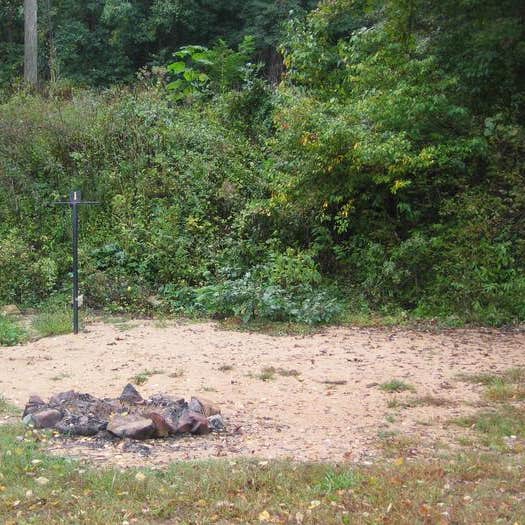
Stone Cliff Campground — New River Gorge National Park and Preserve
Stone Cliff Campground (Thurmond area) is a walk-in tent campground known for its lovely riverside beach setting. It offers 7 tent sites -- five on a broad sandy stretch of New River shoreline and two tucked just back into the woods. A short set of stairs leads from the parking area down to the riverside campsites. There are vault toilets but no drinking water. Campers love the sound of the river at night and the easy access to fishing and wading (though swimming is not advised due to strong currents). The historic ghost town of Thurmond is just 2 miles upstream, and the Stone Cliff Trail departs near the campground for a gentle hike along the river. RV/trailer camping is not permitted at this location due to the walk-in access.
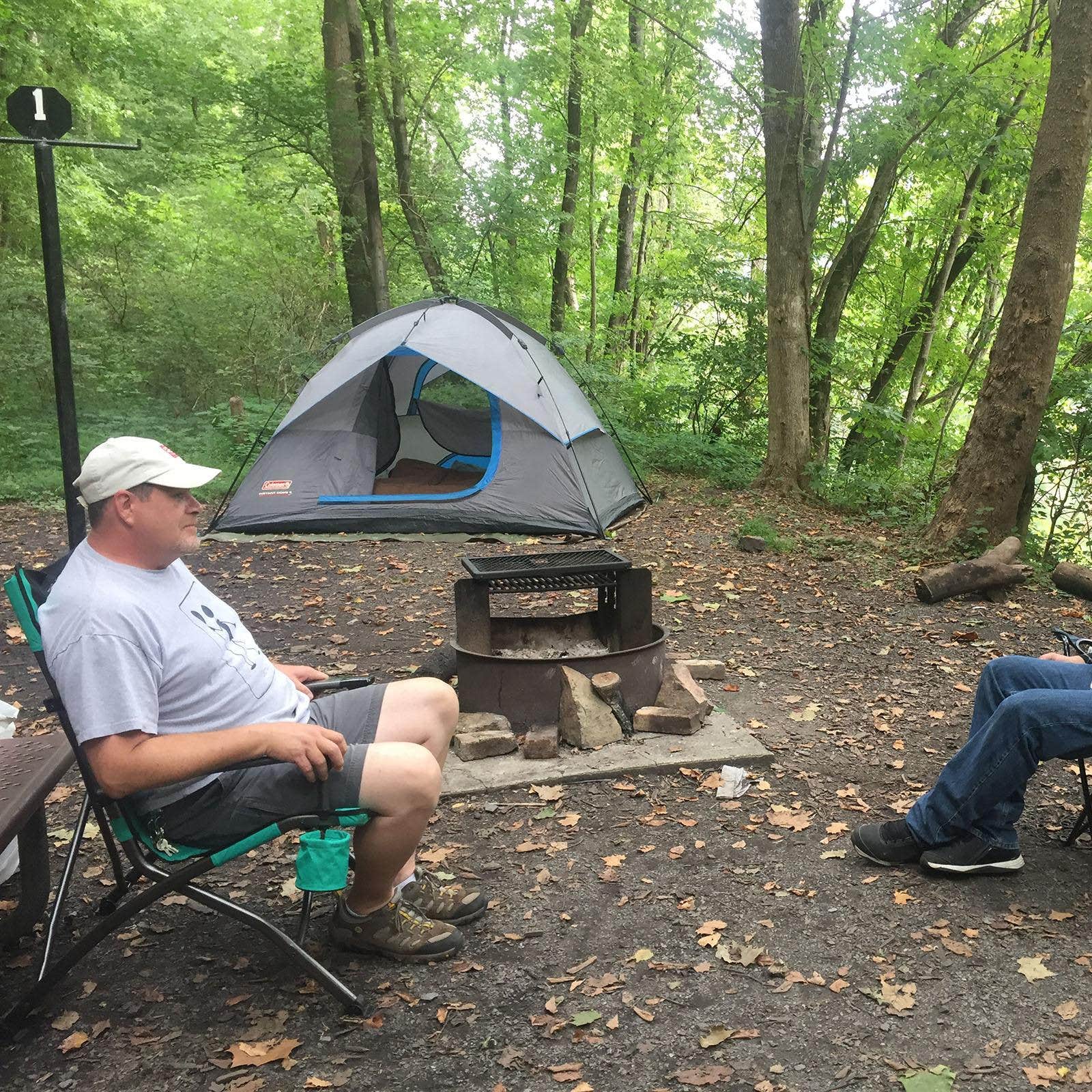
Brooklyn Campground — New River Gorge National Park and Preserve
Brooklyn Campground (Southside Trailhead, Thurmond area) is a small tent-only campground near the Cunard river access, about 5 miles upriver from Thurmond. It features 4 walk-in tent sites along the New River plus 1 drive-in tent site in the parking area. The walk-in sites are a short stroll from the parking lot, offering quiet riverside seclusion. Like other park campgrounds, there is a vault toilet but no water. This campground is adjacent to the Brooklyn-Southside Junction Trail, which follows an old railroad grade along the river. The trail and river access make Brooklyn popular with anglers and hikers. Note: The narrow gravel road to Brooklyn (via Cunard) is winding; trailers and larger RVs are not recommended.
Central New River Gorge Campgrounds (Prince/Grandview Area)
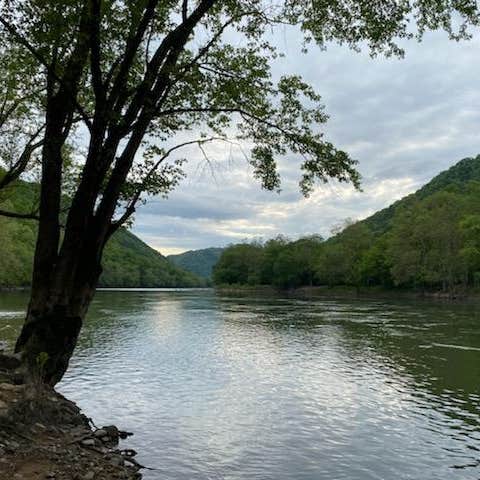
Grandview Sandbar Campground — New River Gorge National Park and Preserve
Grandview Sandbar Campground (Prince area) sits on a wooded sandbar island along the New River, not far from the town of Prince. It offers a mix of walk-in and drive-in sites (about 10 sites total) in a lush riverfront forest. A few sites are right by the water's edge. This campground is free and first-come but can fill up on peak weekends, partly because it has a boat launch popular with locals. Vault toilets and trash dumpsters are provided, but there is no drinking water. The campground is about 5 miles from Grandview (by road), where you can drive to enjoy panoramic gorge views and hiking trails. Grandview Sandbar is a convenient central base camp for exploring both north and south ends of the park.
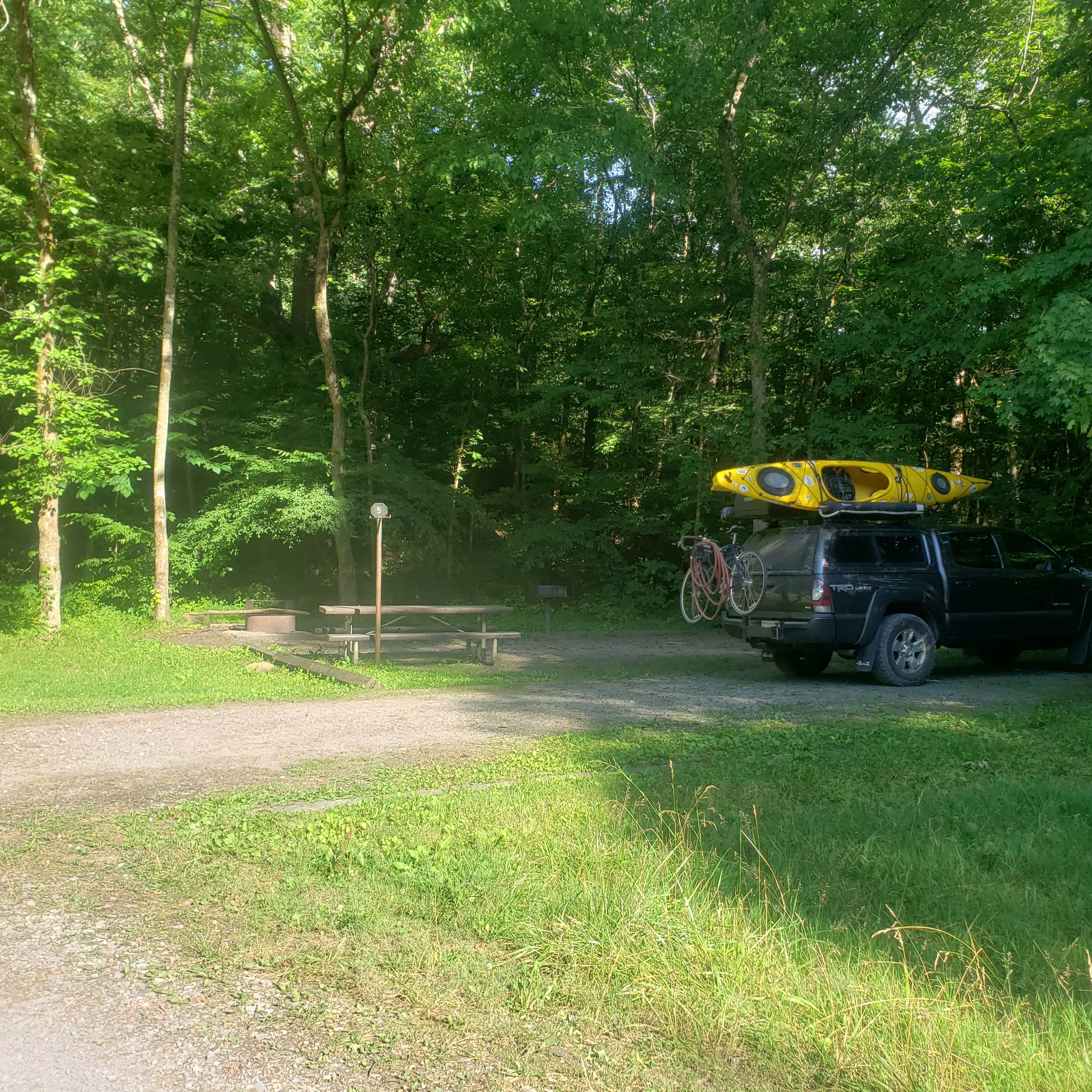
Army Camp — New River Gorge National Park and Preserve
Army Camp Campground (Prince area) is a drive-in campground with 11 campsites along the New River's south shore. Despite the name, it's not a military camp -- the 'Army Camp' name comes from an Army Corps of Engineers river access area. Sites here accommodate tents and small RVs/campervans (no hookups) and are spread in a riverside meadow ringed by hills. A vault toilet is available. This area is known for its scenic mountain backdrop and a calm river section suitable for fishing. The campground is accessed via a narrow gravel road off Route 41 near Prince; trailers over ~25 feet are not recommended. Army Camp's relatively open setting is great for sky views (sunsets and starry nights), but also expect morning fog rising off the river on cool days -- a beautiful sight for early risers.
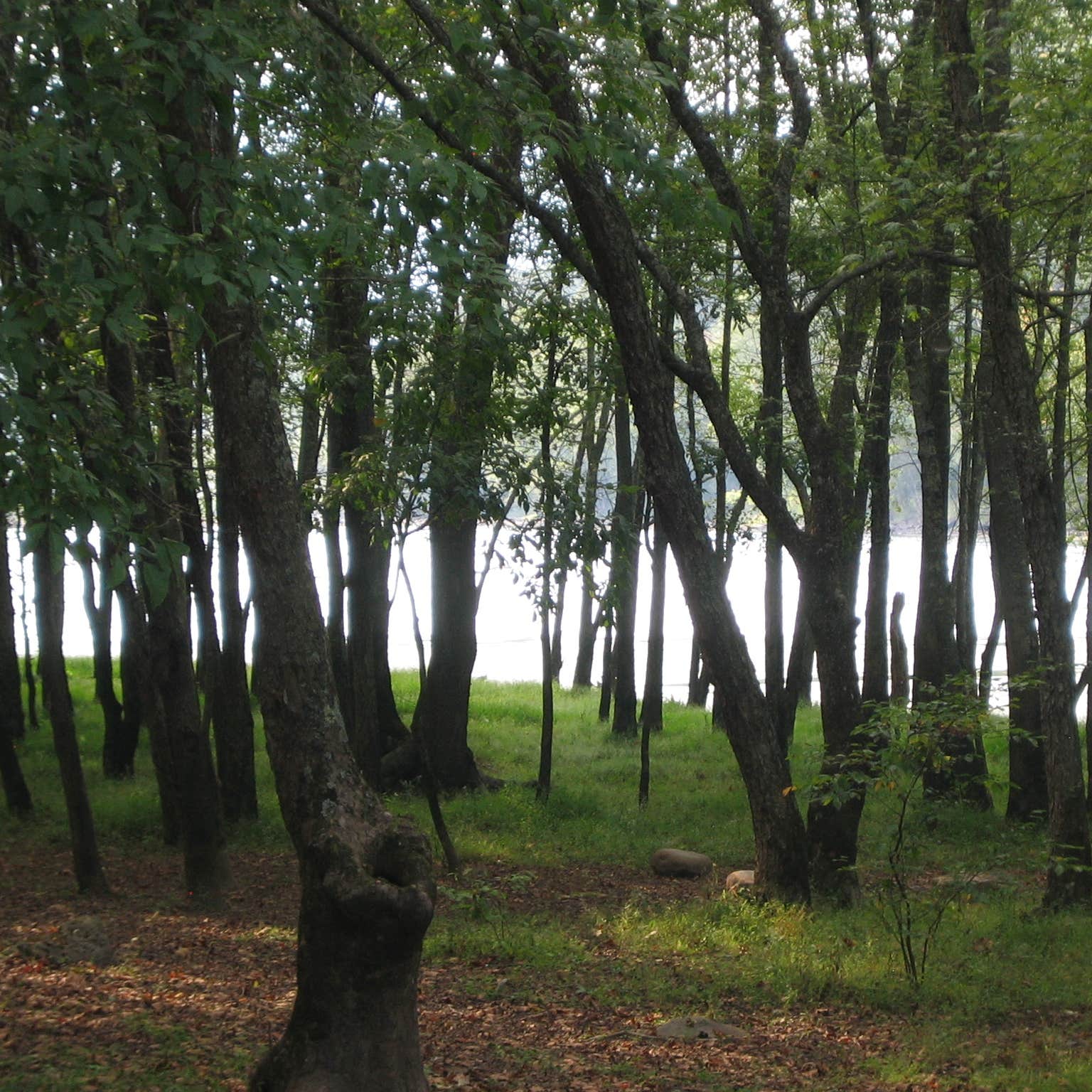
Glade Creek Campground — New River Gorge National Park and Preserve
Glade Creek Campground (Prince area) lies at the end of a 6-mile gravel road following Glade Creek, a tributary of the New River. This campground has 11 sites in total: 6 walk-in tent sites and 5 drive-in sites for tents or small RVs. The walk-in sites are near the creek and accessed by a short footpath, while the drive-in sites are in a loop nearby. Campers adore the peacefulness at Glade Creek -- you'll fall asleep to sounds of the creek and wake to birds in the hardwood forest. A trailhead near the campground leads up Glade Creek to a waterfall and former logging camp remnants, offering a popular hike and swimming hole in summer. Note: The gravel access road is narrow and can be bumpy -- drive slowly. No water is available (filtering from the creek is an option for experienced campers). As with other campgrounds, all trash must be packed out if dumpsters are full, since this remote spot only gets occasional servicing.
Southern New River Gorge Campgrounds (Sandstone Area)
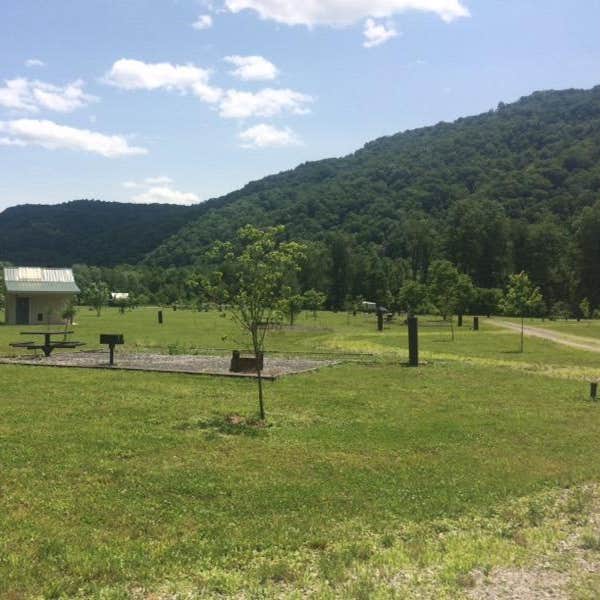
Meadow Creek Campground — New River Gorge National Park and Preserve
Meadow Creek Campground (Sandstone area) is the park's southernmost campground, located near the New River's convergence with the Bluestone River. It offers 17 tent campsites in an open grassy field beside the river. A few sites have shade from riverbank trees, but most are in a meadow that can get sunny and hot by day. A vault toilet and picnic tables are provided, but as with all park sites, no potable water is available (the nearby Sandstone Visitor Center, just 1 mile away, has water and restrooms during the day). Meadow Creek is easily accessed from I-64 (exit 139) and is close to Sandstone Falls -- a boardwalk trail there offers up-close views of the park's largest waterfall. This campground is popular with anglers and paddlers; a canoe/kayak launch is located here for trips on the New River's mellow upper sections. Expect some train noise echoing across the river, and occasional high water flooding in very heavy rains (pay attention to weather if camping here). Group Camping: Meadow Creek also has a reservable group tent site for 8+ people (by special permit) at the far end of the field.
War Ridge/Backus Mountain Campground (Ridgetop)
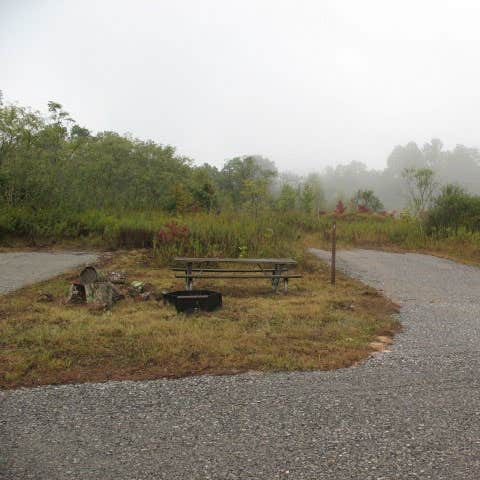
War Ridge / Backus Mountain Campground — New River Gorge National Park and Preserve
War Ridge / Backus Mountain Campground is the only campground in New River Gorge that is not along the river. Perched on a ridgetop about 1,500 feet above the New River, this campground's 8 sites are reached by a secluded gravel road near Backus Mountain (south of Thurmond and Prince). All 8 campsites are drive-in and can accommodate tents or small RVs/trailers, though vehicles over 25 ft are not recommended due to tight turns. There is a vault toilet but no water. What War Ridge lacks in river access it gains in quiet and breeze -- even in midsummer it stays a bit cooler up on the ridge, and fall nights can be quite chilly. Views are mostly filtered by trees, but a short walk from the campground leads to an old overlook of the Thurmond area. War Ridge sees far fewer visitors than the riverside campgrounds, so it's a good bet for finding a spot on busy weekends. The trade-off is a longer drive to activities: allow ~30 minutes to reach the Sandstone (south) or Cunard/Thurmond (north) areas from this campground. One nearby highlight is Babcock State Park (about 12 miles away), where you can visit the famous Glade Creek Grist Mill and even take a shower or stock up on water at the state park campground if needed.
Campground Comparison Table
| Campground | Location & Sites | Access & Notes |
|---|---|---|
| Stone Cliff | Thurmond area (North Gorge) 7 walk-in tent sites | No vehicles at sites (walk-in only) Riverside beach setting |
| Brooklyn | Thurmond area (North Gorge) 4 walk-in & 1 drive-in tent sites | Rough gravel road via Cunard By Southside Trail (hiking/biking) |
| Thayer | Thurmond area (North Gorge) 4 walk-in tent sites | Very remote, quiet locale Alcohol prohibited |
| Grandview Sandbar | Prince area (Central Gorge) ~10 tent sites (mix walk-in/drive-in) | Near boat ramp (can be busy) Popular, may fill on weekends |
| Army Camp | Prince area (Central Gorge) 11 drive-in sites (tent/RV) | Small RVs/trailers OK (no hookups) Open riverside meadow |
| Glade Creek | Prince area (Central Gorge) 11 sites (6 walk-in, 5 drive-in) | Narrow 6-mile gravel road in Trail to waterfall from campground |
| Meadow Creek | Sandstone area (South Gorge) 17 tent sites (drive-up) | Open field by river Near Sandstone Falls & I-64 |
| War Ridge/Backus Mtn | Backus Mtn (Ridgetop) 8 drive-in sites (tent/RV) | Cooler ridgetop location Farther from river activities |
Campground Amenities and Best Uses
Riverside Campgrounds: The seven campgrounds along the New River provide an authentic Gorge experience -- you'll be camping just steps from the water (or on a riverbank bluff). Stone Cliff is beloved for its sandy beach tent spots and proximity to Thurmond's history. Grandview Sandbar and Glade Creek are centrally located and great for hikers and paddlers -- Glade Creek's trailhead and waterfall are a big draw, while Grandview Sandbar offers easy access to Grandview's viewpoints. Army Camp features wide, flat sites ideal for small RVs and star-gazing, and Meadow Creek gives quick access to Sandstone Falls (and the interstate) for those on a road trip. Brooklyn and Thayer are more off-grid -- perfect for campers seeking solitude and a primitive vibe (just be prepared for rough roads and no nearby services).
Ridgetop Campground: War Ridge/Backus Mountain is notably different. At 2,600 feet elevation, it's away from the river's crowds and humidity. This campground is best for campers who value peace and cooler temperatures over river access. It's a good choice in midsummer or on busy holidays when riverside sites are full. However, you'll need to drive to reach any rafting, fishing, or swimming spots, so plan accordingly.
Nearby Developed Camping Alternatives: Because all New River Gorge campgrounds are primitive, many visitors opt for nearby campgrounds with more amenities. Just outside the park, Babcock State Park (20 minutes from Thurmond) has a developed campground with hot showers and electric sites, plus the famous Glade Creek Grist Mill view. Private campgrounds like ACE Adventure Resort (near Oak Hill) or Adventures on the Gorge (near Lansing) offer tent sites, RV hookups, cabins, and even on-site dining and pools -- essentially "basecamps" with guided activities like rafting and zip-lining available. Closer to Fayetteville, campgrounds provide quiet wooded sites with basic facilities and are just a few miles from the Canyon Rim Visitor Center and New River Gorge Bridge.
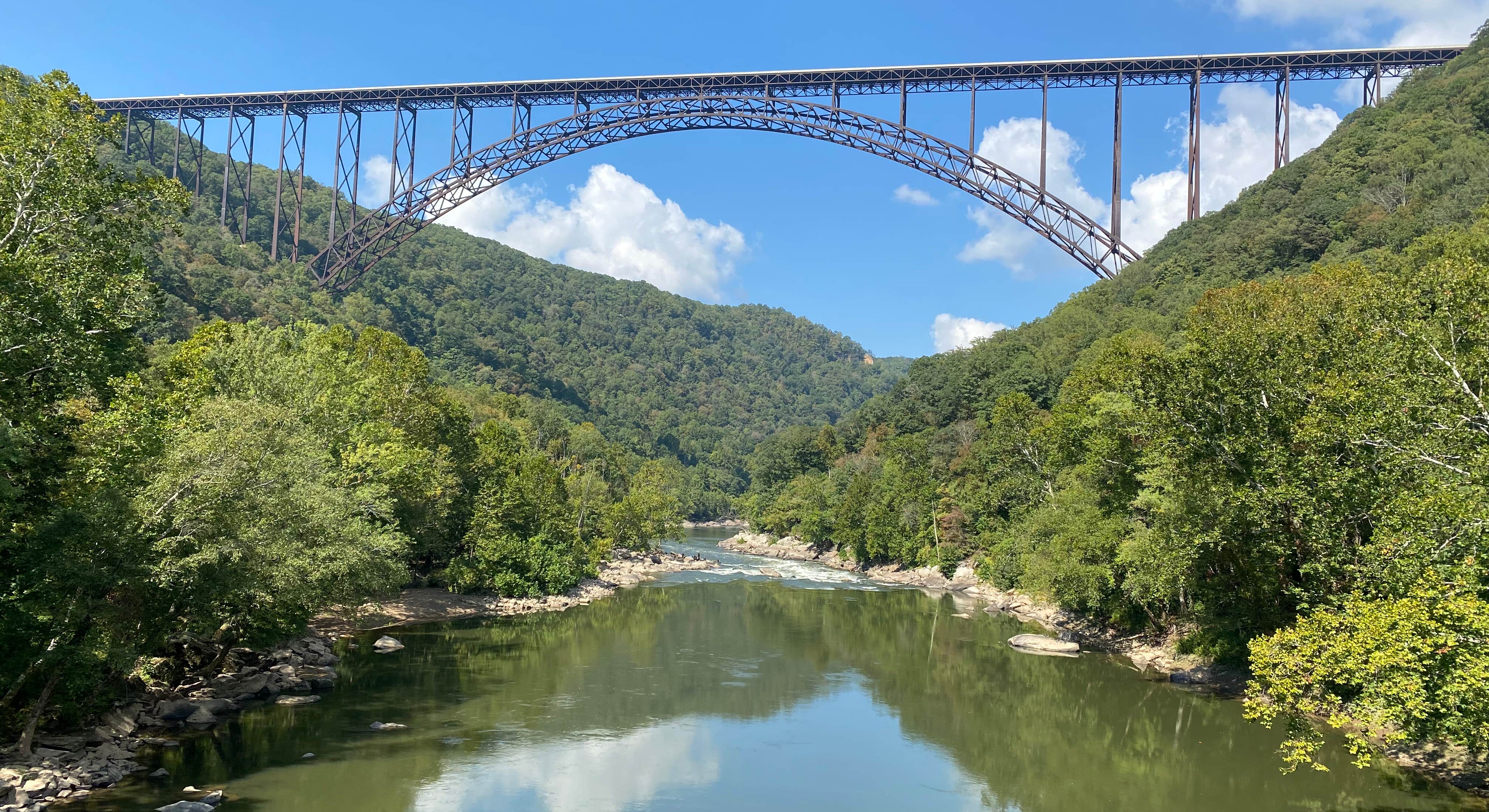 Photo by Mike V
Photo by Mike V
Planning Your New River Gorge Camping Trip 
When to Visit New River Gorge
| Season | Weather | Camping Conditions |
|---|---|---|
| Spring (March-May) | Highs 50-75°F, Lows 30-50°F Frequent rain; river running high | Cool, wet weather -- bring rain gear Wildflowers and peak waterfalls Campgrounds uncrowded (except holidays) |
| Summer (June-August) | Highs 80-90°F, Lows 60-65°F Humid; afternoon storms | All campgrounds open; busiest season Whitewater rafting in full swing Bugs (mosquitoes, ticks) most active |
| Fall (September-October) | Highs 60-75°F, Lows 35-50°F Dry, clear; autumn foliage | Most pleasant weather for camping Stunning fall colors mid-October Popular on weekends (Bridge Day in Oct.) |
| Winter (November-February) | Highs 40-50°F, Lows 20-30°F Occasional snow/ice | Very low visitation; primitive camping only Some gravel roads may be icy or closed Quiet camps, bare trees reveal views |
Spring (March-May):
Spring brings cool temperatures and new growth to the Gorge. Campgrounds are generally quiet aside from spring break and Memorial Day crowds. Expect frequent rain -- April is the wettest month, which swells the New River and creates impressive waterfall displays (Glade Creek Falls will be gushing). Trails can be muddy, and some steep roads (like the one to Brooklyn) may be slick -- a high-clearance vehicle helps in wet conditions. On the plus side, April and May offer excellent fishing and wildflower hikes. Pack warm layers for chilly nights around the campfire, and a backup plan if heavy rains make low-lying camps (like Meadow Creek or Grandview Sandbar) soggy or prone to flooding.
Summer (June-Aug):
Summer is peak season for New River Gorge. All campgrounds are open and tend to fill up on weekends, especially around holidays. Daytime highs in the 80s°F with high humidity mean you'll appreciate campsites near the water for swimming or wading (again, use caution -- the New River's current is strong). Afternoon thunderstorms are common, so a sturdy tent and rainfly are essential. Bugs are out in force -- bring insect repellent for mosquitoes, and do a tick check each day after hiking or sitting in grass. On hot days, plan activities early or late; midday, your campsite might be a good place to relax in shade or even take a short drive to a local ice cream shop in Fayetteville. Fireflies light up the forests in early summer, creating magical evenings for campers.
Fall (Sept-Oct):
Autumn might be the most beautiful time to camp in the Gorge. Warm days and crisp nights, with much lower humidity, make for comfortable camping. By late September, the forests start turning gold, orange, and red -- by mid-October the fall foliage is usually at its peak. All park campgrounds typically remain open until at least late October. The main event is Bridge Day, held the third Saturday in October, when hundreds of BASE jumpers leap from the New River Gorge Bridge. This brings big crowds to the Fayetteville area for a long weekend of festivities. If visiting then, expect campgrounds (and hotels) to be busy -- arrive early to secure a spot. After Bridge Day, things quiet down quickly. Night temperatures in fall often dip into the 40s or even 30s°F, so bring a cold-weather sleeping bag and extra blankets. Also note that as leaves drop, it becomes easier to spot historic sites and rock outcroppings normally hidden by foliage.
Winter (Nov-Feb):
Winter is the quietest season. Temperatures can drop well below freezing at night, and occasional snow or ice may temporarily close some park roads (especially unpaved ones). Only hardy campers visit in winter -- often you'll have an entire campground to yourself. The upside is serene beauty: leafless trees open up new vistas of the cliffs and river, and you might glimpse wildlife like deer or even bobcats venturing near empty camps. Mammals like black bear are mostly denning or less active, but bald eagles are easier to spot along the river in winter. If you camp in winter, come prepared for winter survival: bring ample warm gear, high-calorie food, and a backup heat source (propane stove, etc.) since campfires alone may not keep you warm through 20°F nights. Check with rangers or the park website for any road or site closures before you go, and be prepared to pack out your trash if services are reduced in the off-season.
New River Gorge Reservation Systems Explained
Because no reservations are accepted in the park, success depends on timing and flexibility. Plan to arrive early in the day, especially on summer Fridays or holiday weekends. Campsites are first-come, first-served and can fill by afternoon. If possible, claim a site Thursday evening or early Friday to beat the rush. Have a backup campground in mind in case your first choice is full (nearby state parks or private campgrounds often have availability when the park does not).
Campground Costs and Budgeting
One of the great things about New River Gorge National Park: camping is completely free inside the park. There are no nightly fees for any of the 8 campgrounds, which is a rarity among national parks. This makes New River Gorge an attractive destination for budget-conscious travelers and avid road-trippers.
Do keep in mind, though, that "free" doesn't necessarily mean "no costs at all" -- you'll need to factor in the expenses of being self-sufficient. For example, if you didn't bring enough water, you might be buying bottled water from a gas station 20 miles away. Ice runs ~$3-$5 per bag at local stores. Firewood, if you choose to buy it, is around $6-$8 per bundle in the area (and available at places like gas stations in Glen Jean or outdoor outfitters in Fayetteville). That said, compared to staying at developed campgrounds or resorts, your expenses at New River Gorge will be minimal.
Additional Fees and Budget Tips
Nearby Paid Campgrounds: If you decide to mix in a night at a campground with amenities, here are typical costs (2025) in the vicinity: Babcock State Park campground is $27/night for standard sites (showers included), ACE Adventure Resort ranges from $20/night for primitive tent spots up to $40-$50 for RV sites with hookups, and local private campgrounds like Arrowhead Bike Farm average $30-$35/night for two people. All of those require reservations or same-day registration and, of course, payment. Some travelers choose to use the free park campgrounds for most of their stay, then spend one night at a paid campground to shower and recharge devices.
Dispersed Camping: Unlike some western parks, dispersed camping (camping outside of designated sites) is not allowed within New River Gorge National Park boundaries. You must camp in the designated campground sites. However, the adjacent New River Gorge Preserve (managed by the NPS as well) and nearby public lands have a few options. For those interested in dispersed camping near New River Gorge NP, consider locations like the Beury Mountain Wildlife Management Area, not far from Thurmond -- it offers free dispersed camping on state land (no facilities). Always confirm land ownership and rules before dispersed camping; private property is common in the patchwork around the park, and trespassing is prohibited. If unsure, stick to the official campgrounds or ask a ranger for guidance.
Essential Gear for New River Gorge Camping
Preparing the right gear will ensure you have a comfortable and safe experience. Here's a checklist of items and considerations for camping at New River Gorge:
Shelter and Sleep:
- Tent and Rainfly: A durable tent with a full-coverage rainfly is a must -- summer thunderstorms can be intense. Stake your tent well; sudden wind gusts can come up the gorge.
- Sleeping Bag: Nights can be cool even in summer (down to 60°F or lower). A 3-season bag rated ~20-30°F is wise, plus a fleece liner or blanket for spring/fall.
- Sleeping Pad: Campsites are generally flat but can be gravelly or hard-packed. A good insulated sleeping pad will provide comfort and keep you warmer.
- Camping Pillow: Optional, but nice to have. Or use a stuff sack with clothes as a pillow to save space.
Camp Kitchen:
- Water Containers: Since there's no water on site, bring large water jugs (5-7 gallons total capacity for a couple days, more for larger groups). You can refill in town or at visitor centers.
- Stove and Fuel: Campfires are allowed in fire rings, but a propane/butane camp stove is faster and cleaner for cooking. Bring ample fuel, as stores may be far.
- Cooler: A cooler with ice will keep food fresh in summer heat -- just store it in your vehicle at night to deter animals.
- Cooking Gear: Pack a pot, pan, utensils, knives, plates, and mugs. Don't forget a can opener and a lighter/waterproof matches. Aluminum foil is handy for grilling over coals.
- Trash Bags: Essential for packing out garbage. If campground dumpsters are available, use them, but they sometimes overflow -- be prepared to carry trash until you find a proper receptacle.
Clothing and Footwear:
- Rain Gear: A quality rain jacket (and rain pants if you have them) will keep you comfortable during frequent rain showers. Also bring an extra tarp or canopy if you plan a longer stay -- it's great for creating a dry hangout area.
- Layered Clothing: Summertime calls for moisture-wicking T-shirts and shorts during the day, but also pack long sleeves and long pants for bug protection at dusk. A warm fleece or puffy jacket is needed on cooler nights, especially in spring/fall.
- Footwear: Sturdy hiking boots or shoes for trails, and water sandals or old sneakers if you plan on wading or rafting. Around camp, a comfortable pair of sandals or camp shoes will let your feet breathe.
- Swimsuit and Towel: Even if you don't plan to swim in the river (which is risky in many spots), you might want these for wading, taking a dip at a calm spot, or visiting nearby adventure resorts with water features.
- Hat and Sun Protection: The sun can be strong on open water and exposed rock outcrops. Bring a wide-brim hat, sunglasses, and plenty of sunscreen.
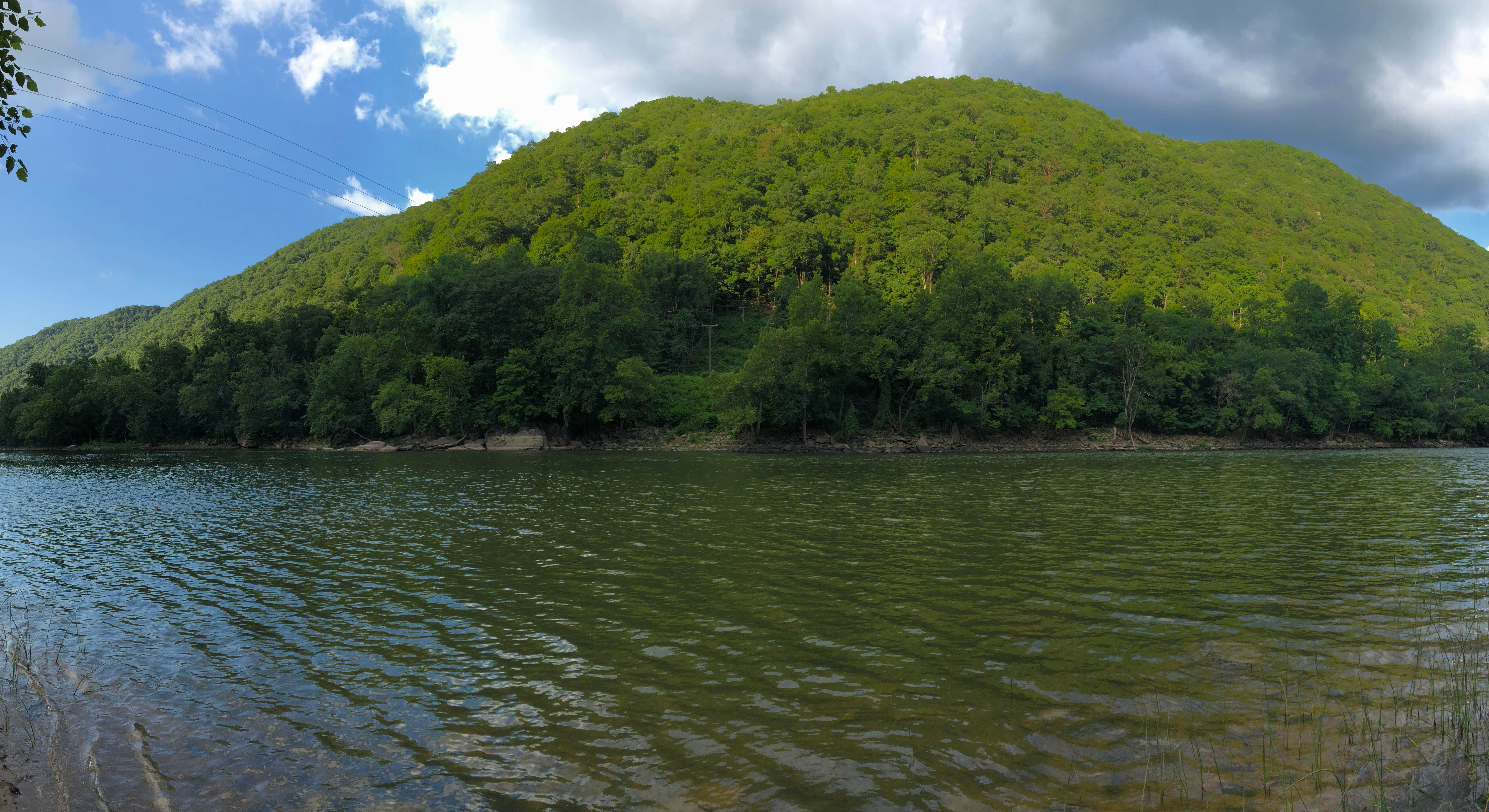 Photo by Alyssa V
Photo by Alyssa V
Wildlife Safety and Park Regulations 
Black Bear Safety in New River Gorge
New River Gorge has black bears, raccoons, and smaller critters that will gladly investigate your campsite if you leave food unsecured. Use the metal trash dumpsters or bear-proof cans where provided, and keep food in locked vehicles or hard-sided containers whenever you're not eating. Never leave coolers or food scraps out overnight. This protects both you and the wildlife. Also be mindful that snakes (including non-venomous watersnakes and the venomous copperhead) inhabit the area -- wear closed-toe shoes in camp at night and use a flashlight.
Park Regulations and Etiquette
| Regulation Category | Specific Rules | Penalties |
|---|---|---|
| Campfires | Allowed only in established fire rings Never leave unattended Completely extinguish before leaving | Citations and fines Possible campground eviction |
| Quiet Hours | 10:00 PM to 6:00 AM Generators (if used) sparingly and not in tent-only areas | Warnings and possible eviction |
| Alcohol | Prohibited at Thayer Campground Use discretely at other locations | Citations and possible eviction |
Additional Park Regulations
Quiet hours in the park are officially 10 PM - 6 AM. Generators, if you must use one, should be run sparingly (and not at all in tent-only areas like Stone Cliff or Thayer). Keep pets leashed and under control; always pick up pet waste so as not to attract animals. Remember that alcohol is prohibited at Thayer and generally should be used discreetly elsewhere. With the close proximity of some sites, a little courtesy goes a long way -- most visitors are here for peace and nature.
For non-emergencies or park information, you can contact the Canyon Rim Visitor Center (north) or Sandstone Visitor Center (south) during daytime. Always let someone know where you're camping, especially if you plan to hike or raft out of cell range. New River Gorge is a wonderful place to explore, but it remains a wild environment -- proper planning and caution will ensure your trip is a safe one.
Beyond the Campground: Activities and Exploration 
Camping in New River Gorge isn't just about the campsite -- it's about all the adventures to be had just beyond your tent. Whether you're seeking adrenaline-pumping outdoor sports or leisurely explorations, the Gorge offers plenty to fill your days. Here are some ideas for day trips, hikes, and river activities accessible from the various campgrounds:
Day Trips from New River Gorge Campgrounds
From Thurmond Area Campgrounds (Stone Cliff, Brooklyn, Thayer):
Camping near Thurmond puts you in the heart of the park's historic district. Start with a visit to the Thurmond Ghost Town -- once a bustling coal town, now an NPS-managed historic site with a restored train depot museum. It's only a couple miles from Stone Cliff (and reachable by road or a long walk along the railroad). In summer, you might catch sight of rafters taking out at Thurmond after running the New River's lower rapids. Speaking of rafting, several outfitters launch whitewater rafting trips from Cunard (just upriver from Brooklyn Campground). Half- or full-day rafting on the Lower New River (Class III-IV rapids) is a highlight for many visitors -- you'll plunge through famous rapids like Surprise and Double Z. If you prefer dry land, hike the Southside Trail from Brooklyn Campground, which leads 7 miles downstream past old mining ruins and riverside forests. A shorter excursion is the Stone Cliff Trail, a 2.7-mile out-and-back path from Stone Cliff Campground that offers a peaceful wooded walk and river overlooks. For a big view, drive 35 minutes north to New River Gorge Bridge near Fayetteville -- the iconic arch bridge is a must-see and has a walking boardwalk overlook. End your day in Fayetteville with a wood-fired pizza or craft beer (the town has a surprisingly good food scene for its size).
From Prince/Grandview Area Campgrounds (Army Camp, Grandview Sandbar, Glade Creek):
Being near Prince and Grandview gives you access to both cultural and natural attractions. A short drive from camp takes you to Grandview where you can peer 1,400 feet down into the gorge from Main Overlook or hike the Grandview Rim Trail to Turkey Spur for panoramic vistas. In late spring, Grandview is famous for its rhododendron blooms, which paint the understory in pink and white. Down by the river at Prince, you'll find a historic train depot (currently a seasonal visitor contact station) -- Prince is one of the few places where Amtrak's Cardinal line stops in the park. If you're up for a scenic drive (approximately 30-40 minutes), head south to Sandstone Falls, the largest waterfall on the New River. A boardwalk trail there allows you to walk right up to the cascading falls on a series of islands. Anglers might spend a morning fishing for smallmouth bass near the mouth of Glade Creek, then have a picnic lunch at the Glade Creek trailhead picnic area. Another unique stop: the Beckley Exhibition Coal Mine (about 25 minutes from Grandview Sandbar) where you can tour an underground coal mine with a veteran miner as guide -- a great way to connect with the region's coal heritage (and a nice rainy-day activity).
From Sandstone Area Campground (Meadow Creek):
If you're camping at Meadow Creek, you're just a stone's throw from the Sandstone Visitor Center off I-64. Start there for interactive exhibits on the New River's ecology and to chat with rangers about current conditions or lesser-known spots. A must-do nearby is visiting Sandstone Falls -- drive 15 minutes down River Road to reach the parking area, then stroll the easy boardwalk to multiple viewing platforms over the falls. This is a fantastic spot for photography, especially in morning light or when autumn leaves are at peak. Below Sandstone Falls, the New River widens and calms as it enters Bluestone Lake; consider an afternoon at Bluestone Lake State Park (20 minutes south) for lake swimming or renting a kayak. The town of Hinton, just south of Meadow Creek, has a historic downtown with shops and a railroad museum -- grab an ice cream at The Market on Courthouse Square and enjoy the small-town charm. If you're up for a longer excursion, drive an hour south to Bluestone National Scenic River or Pipestem Resort State Park, where you can ride an aerial tram down into the Bluestone Gorge. In winter, Pipestem even offers an indoor pool -- a nice little luxury after roughing it!
From War Ridge Campground (Backus Mountain):
War Ridge's remote location means driving is required for most activities, but it also places you roughly midway between several points of interest. A 25-minute drive west gets you to Babcock State Park, home of the oft-photographed Glade Creek Grist Mill (especially gorgeous in fall) and trails ranging from easy creekside walks to challenging climbs. You can also fish or rent a rowboat at Babcock's small lake. Heading north from War Ridge ~30 minutes brings you to the Canyon Rim Visitor Center at Lansing -- here you'll get another stunning view of the New River Gorge Bridge from above, and it's the starting point for the Endless Wall Trail (more on that in the hiking section below). If rock climbing is your thing, the NPS's Burnwood climbing area is just across from Canyon Rim center, offering some beginner-friendly routes to try. For a unique day trip, drive about 40 minutes east to the town of Lewisburg -- it's outside the park but is a quaint historic town voted one of "America's Coolest Small Towns," with boutiques, art galleries, and the remarkable Lost World Caverns (where you can tour a massive cave system). War Ridge may be out of the way, but it rewards campers with flexibility -- you can choose an adventure in any direction, then return to your quiet mountaintop camp in the evening.
Top Hiking Trails Near Campgrounds
| Trail Name | Difficulty & Distance | Highlights |
|---|---|---|
| Endless Wall Trail | Easy/Moderate 2.4 miles (loop) | Clifftop walk with dramatic gorge views, Diamond Point overlook, great for sunrise/sunset, forest wildflowers |
| Long Point Trail | Moderate 3.2 miles RT | Iconic view of NRG Bridge from rock outcrop, gradual climb through woods, especially beautiful in fall |
| Glade Creek Trail | Moderate 5.6 miles RT (or more) | Follows scenic Glade Creek to a waterfall and swimming hole, rhododendron thickets, remnants of old homesteads |
| Grandview Rim & Castle Rock | Moderate 3.0 miles (loop) | Stunning vistas from Main Overlook and Turkey Spur, unique rock formations at Castle Rock, spring rhododendrons |
| Kaymoor Miner's Trail | Strenuous 1.6 miles RT | Steep descent (821 steps) to historic coal mine ruins, mine entrance and coke ovens, waterfall near trailhead |
Water Activities in New River Gorge
The New River itself is the main attraction for many campers -- it offers world-class whitewater, tranquil fishing spots, and scenic vistas from the water:
Whitewater Rafting: New River Gorge is one of the East's premier rafting destinations. The Lower New River (from Cunard or Thurmond down to Fayette Station) delivers Class III-IV rapids in the summer, with even bigger water in spring. Numerous outfitters (ACE, Adventures on the Gorge, New & Gauley River Adventures, etc.) offer half-day and full-day trips. First-timers are welcome -- guides will handle the raft, but be prepared to paddle hard through rapids like Double Z and Greyhound Bus. Minimum ages are usually around 12 for the Lower New's bigger rapids. If you're camping near Stone Cliff or Army Camp, you'll see rafts float by on trip days. The Upper New River (from near Sandstone to Thurmond) provides gentler Class I-III rapids suitable for families (kids as young as 6). Peak rafting season is late spring through summer; in the fall, attention shifts to the nearby Gauley River's famous releases. Many campers plan at least one day for a New River rafting adventure -- it's an unforgettable way to experience the Gorge from below.
Fishing: Anglers will find smallmouth bass aplenty in the New River, along with species like rock bass, catfish, and muskellunge. A West Virginia fishing license with a National Forest stamp (good for national park waters too) is required -- you can purchase these online or at local bait shops. Excellent fishing spots include the mouths of tributaries (Glade Creek, Meadow Creek) and below Sandstone Falls for walleye. Fly fishing is popular on Glade Creek and in calmer New River stretches for smallmouth. Spring and fall are prime fishing seasons; in summer, go early or late in the day for the best bite. Note that New River's waters are typically murky green and can run fast -- be cautious wading and consider a personal flotation device (PFD) when fishing from shore, especially if you're alone.
Swimming and Wading: Swimming in the New River is not recommended in most places -- the currents are deceptively strong and the river bottom drops off suddenly. Even strong swimmers have been caught off-guard. Instead of swimming in the main river, use life jackets and splash around in shallow embayments or near the shore at places like Stone Cliff's beach or the edges of Sandstone Falls' islands. Always supervise children very closely by the water; a sturdy stick or trekking pole can help feel for deep spots when wading. For a more relaxed swim, many campers head to Summersville Lake (about 45 minutes north of Fayetteville) which has clear, calm water and even a beach at Battle Run. Lake Stephens near Beckley is another option with a roped-off swimming area. If you do take a dip in the New River, wear a life jacket -- it's common to see even experienced guides and locals doing so. The park strongly advises wearing PFDs near any riverbanks.
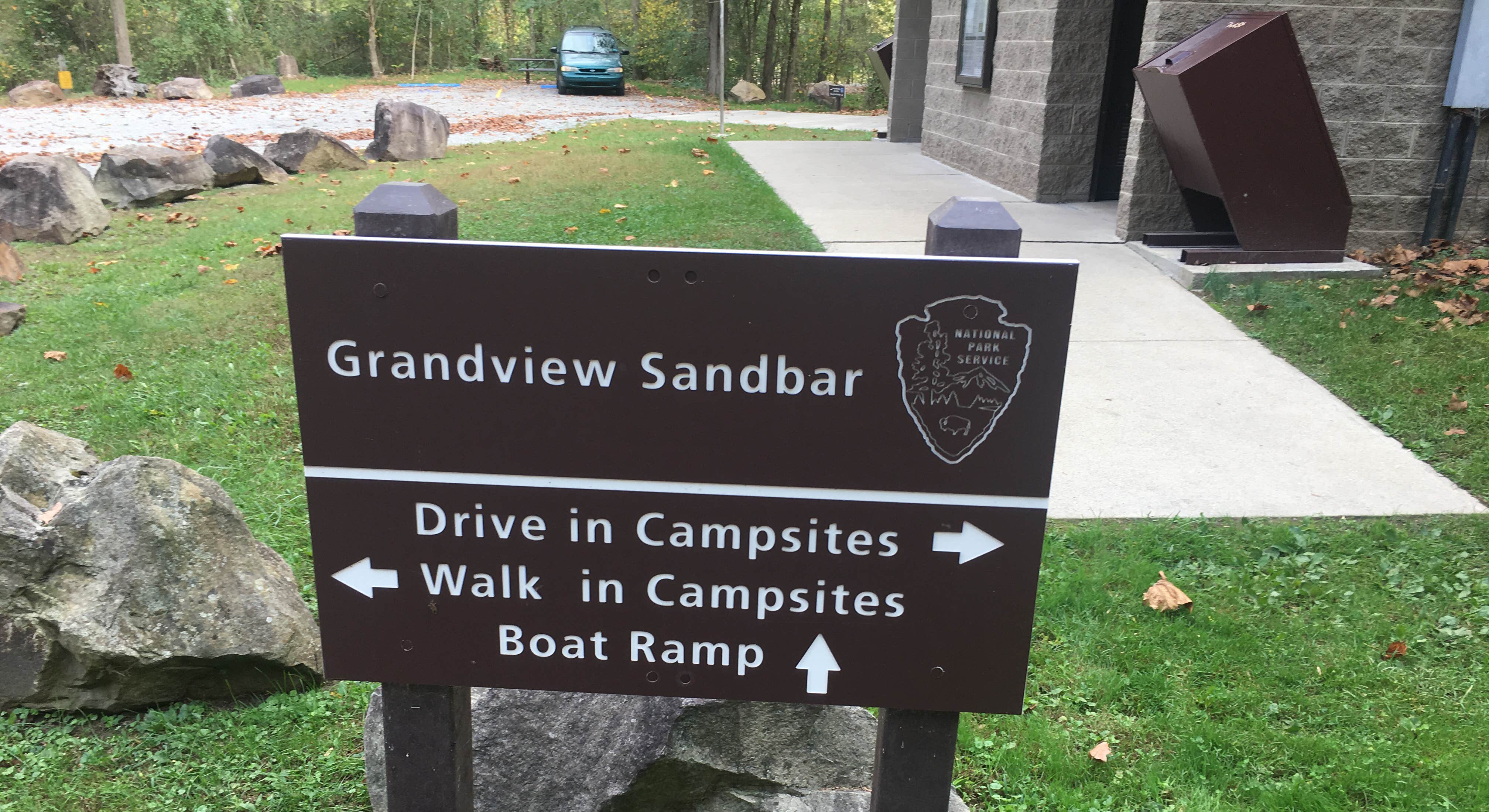 Photo by Ben R
Photo by Ben R
The Dyrt Community Insights 
Sometimes the best camping advice comes from fellow campers. The Dyrt camping community -- including The Dyrt Rangers (top reviewers) -- have shared their experiences and tips from New River Gorge. Here are some insider insights to help you make the most of your trip:
Ranger Recommendations
Grandview Sandbar -- Plan for Weekdays: "Try Grandview Sandbar Campground mid-week if you can," suggests one Dyrt Ranger. Weekends can get crowded here because of the boat launch and easy access. Arriving on a Tuesday or Wednesday often means having your pick of riverfront sites, whereas Fridays fill up fast.
Stone Cliff -- Best for Beach Lovers: Rangers consistently mention Stone Cliff as a favorite for its unique beach setting on the river. "It's one of the prettiest spots to pitch a tent in the whole park," says a Ranger, who notes that the sandy ground is comfortable for sleeping. Just watch for higher water after big rains -- a couple of those beach sites can get a bit soggy if the river rises quickly.
Safety Note at Glade Creek: One experienced camper (now Ranger) cautions that Glade Creek's road, while beautiful, is long and narrow: "If you meet another car, someone's backing up." Drive very slowly and be ready to reverse to a wider section of road if you encounter oncoming traffic. The destination, they add, is worth it: "I had the most serene night by the creek, falling asleep to frogs and whip-poor-wills."
Thurmond Ghost Town by Moonlight: A fun tip from a Ranger-photographer: visit Thurmond at night (it's accessible 24/7) for a spooky and beautiful experience. "Full moon nights in Thurmond are unreal -- the abandoned buildings glow and you might hear nothing but the river and a distant owl." Bring a flashlight and do this only if you're comfortable with solitude (and ghosts!). It's a short drive from Stone Cliff or Brooklyn camp.
Top-Rated Sites from The Dyrt Community
| Category | Top Pick & Rating | Key Highlights |
|---|---|---|
| Highest-Rated In-Park | Grandview Sandbar Campground 4.8/5 | Riverside sites with soothing river sounds, central location, great for kayaking or fishing right from camp |
| Most Scenic Campground | Stone Cliff Beach Campground 4.7/5 | Beautiful sandy riverbank setting, starry skies, swim/wade spots (with caution), feels like a hidden beach |
| Top State Park Nearby | Babcock State Park Campground 4.6/5 | Electric sites and hot showers, famous mill and lovely hiking trails, 20 min from Canyon Rim (bridge) |
| Best Adventure Resort | ACE Adventure Resort Camping 4.5/5 | Water park, zip lines, guided rafting on site, tent and RV sites plus cabins, ideal for families and thrill-seekers |
| Favorite Private Campground | Arrowhead Bike Farm 4.5/5 | Friendly hosts, clean facilities, wooded sites, bike rentals and craft beer garden on-site |
Community Insights and Recommendations
Grandview & Glade are Gems: Many campers rave that Grandview Sandbar and Glade Creek are the "crown jewels" of NRG camping. They love falling asleep by the water at Grandview Sandbar and cite Glade Creek's mix of creek and river access as a huge plus. One Dyrt review notes: "These sites...no water, no electric, no modern facilities...however, they are free and it's all about location" -- a sentiment echoed by dozens of visitors.
Expect Primitive Conditions: A common thread in reviews is reminding new visitors that "primitive" truly means primitive. For example, at some sites the vault toilets can get a bit ripe in hot weather and might go a while between service. A camper at Grandview Sandbar mentioned "the bathrooms are very old and the pits stink throughout the campground" -- an exaggeration perhaps, but the point is to come with managed expectations. Bringing your own supply of toilet paper and hand sanitizer is wise, as is keeping your sense of humor if a resident spider greets you in the privy.
Stay Alert to Flooding: Locals and repeat visitors point out that water levels on the New River can rise rapidly after heavy rain or dam releases upstream. A community tip: if you're in a low-lying campground like Stone Cliff or Meadow Creek and a multi-inch rain is forecast, consider relocating to higher ground (or at least moving your tent to a higher spot in the campground). One reviewer at Stone Cliff noted that "when there is a lot of rain there is definitely the chance it'll flood". Park rangers will close campgrounds if major flooding is imminent, but minor high water can still inundate the beach or low sites.
Local Flavor: Campers consistently praise the local communities around the park. The town of Fayetteville gets shout-outs for its eateries like Pies and Pints (pizza) and Cathedral Cafe (housed in a converted church). Several Dyrt users mentioned grabbing breakfast at Country Thai in Lansing (a quirky spot that serves Thai food and country cooking) before hitting the trail. And if you need a hot shower or a laundry day, Cantrell Ultimate Rafting in Fayetteville offers both for a small fee even if you're not a guest -- a good insider tip if you've been roughing it for a while. The New River Gorge Campground operated by the American Alpine Club is another favorite among climbers for its affordable rates and social atmosphere.
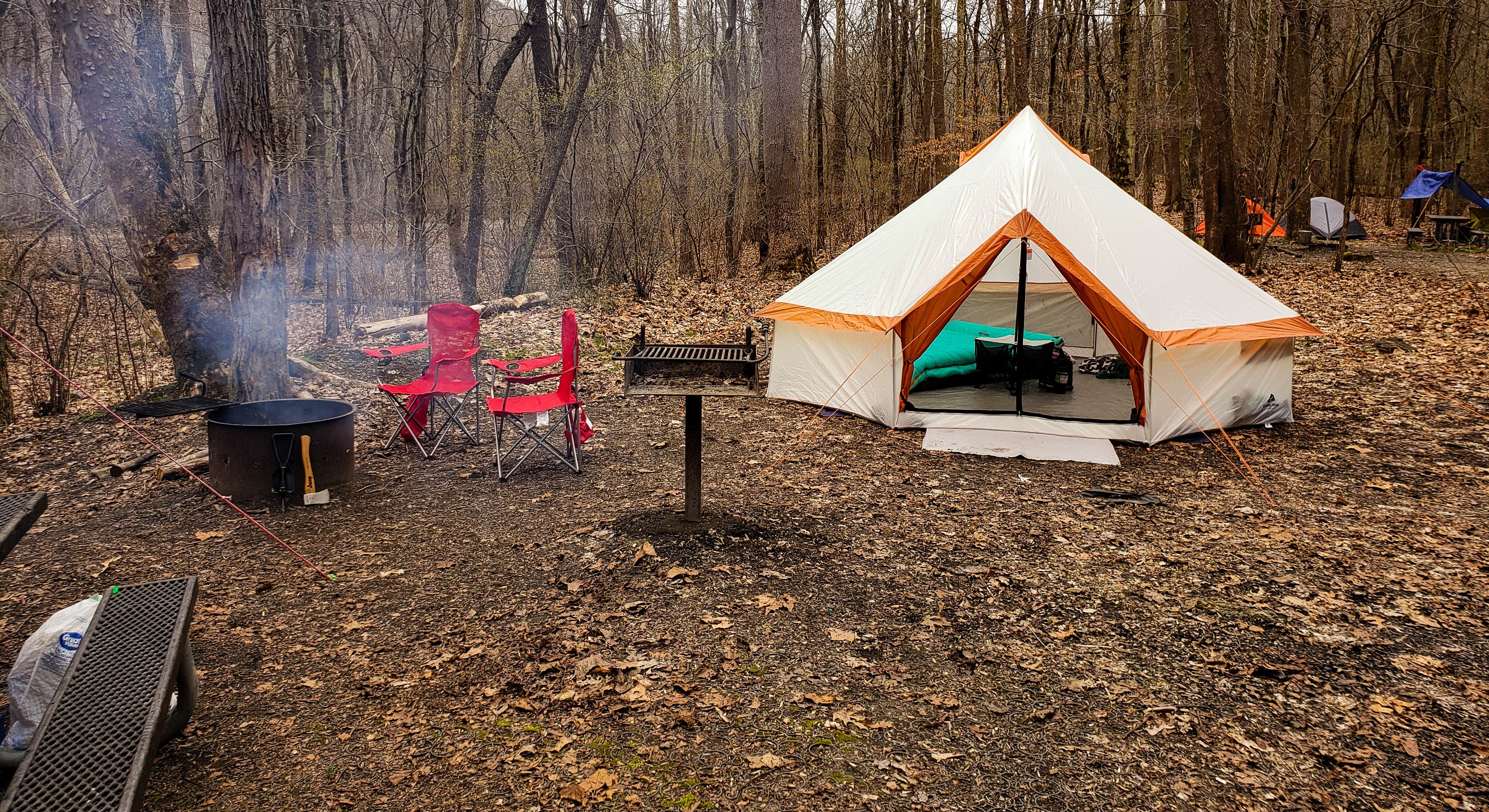 Photo by Gage W
Photo by Gage W
Responsible Camping Practices 
Camping at New River Gorge is an opportunity to enjoy nature in a pristine environment. With that comes the responsibility to minimize our impact and keep the park wild and beautiful. Here are key Leave No Trace and responsible camping principles to follow in the Gorge:
Pack It In, Pack It Out:
There are no trash cans at some campgrounds (and dumpsters, where provided, can overflow), so it's vital that you carry out all your garbage. Bring extra trash bags and secure your trash overnight (in a vehicle or hung up) so animals can't scatter it. Micro-trash like food wrappers or bottle caps is harmful to wildlife -- double-check your site for any tiny litter before you leave. Leaving the site cleaner than you found it helps keep campsites pleasant for the next visitors and prevents attracting bears or raccoons.
Use Established Sites and Rings:
Always camp in the designated, numbered campsite spots -- do not create new sites in the park or camp outside of official campgrounds. Each site has an impact on the land; concentrating use in established spots preserves the surrounding forest. Similarly, use the provided fire ring or grill for any campfire. Scarring new ground with fire pits or clearing vegetation for tents is not allowed. If you're heading to dispersed camping areas outside the park, choose sites that are obviously previously used and follow all WMA or forest rules.
Fire Safety and Regulations:
Keep campfires small and manageable, and only burn dead, downed wood gathered from the area (or bring local firewood). Cutting live trees or branches is illegal and harms the ecosystem. Never leave a fire unattended -- winds can spread embers quickly, especially on dry ridge tops like War Ridge. Before you go to bed or leave camp, drown the fire thoroughly with water, stir the ashes, and drown again until everything is cold. During dry spells, check for fire restrictions; obey any burn bans issued (they are not common in this lush region, but can happen in drought conditions). Many campers carry a gallon of water specifically for fire suppression, just in case.
Respect Wildlife:
You are a guest in the home of many wild creatures. Observe animals (like deer, river otters, or bald eagles) from a distance -- use binoculars if you have them. Approaching or feeding wildlife is harmful and prohibited. Keep your camp area clean of food scraps, which means doing dishes at least 200 feet away from streams and the river and scattering strained dishwater so it doesn't attract animals. At night, secure all food, trash, and scented items (store in a vehicle or hang food bags if in a pinch). Black bears in West Virginia are generally shy, but a food reward can make them bold. A fed bear quickly becomes a problem bear -- don't let that happen. Also, be mindful of smaller critters: chipmunks, raccoons, and even skunks might wander through camps looking for crumbs, so police your site for any food debris.
Keep Waterways Clean:
The New River is the centerpiece of the park -- do your part to keep it clean. No soapy bathing or dish washing directly in the river or creeks. Even biodegradable soap should be used sparingly and at least 200 feet from water, letting the soil filter it. If you want a rinse after a hot day, consider a solar camp shower bag hung from a tree (again, away from the water source). Human waste should only be disposed of in restrooms or vault toilets. If you're ever caught far from a facility, bury waste 6-8 inches deep and at least 200 feet from water, and pack out toilet paper in a sealed bag. Also, fishing line and hooks can be deadly to wildlife -- if you fish, take care to collect any broken line or lures. The New River is an American Heritage River and home to species like the endangered Appalachian elktoe mussel -- by keeping pollutants and trash out of the water, we help all aquatic life.
Be Considerate of Others:
New River Gorge's campgrounds are typically quiet, peaceful places. Help keep them that way by following the golden rule of camping: treat other visitors as you'd like to be treated. Keep noise to a minimum after dark (sound travels far in the open gorge). Use headphones if you want to listen to music. Control your pets -- not everyone loves a friendly dog running into their site uninvited. If you arrive late at night or leave early, use a soft voice and low lights to avoid disturbing people. In short, be a good neighbor. This ensures everyone -- including you -- can enjoy the natural sounds of the river and forest.
Frequently Asked Questions 
Are reservations required for New River Gorge campgrounds? No, all campgrounds within New River Gorge National Park operate on a first-come, first-served basis year-round. No reservations are accepted at any park campground. This makes timing crucial -- arrive early in the day, especially on summer weekends, to secure a site. If park campgrounds are full, consider nearby horse-friendly campgrounds or other alternatives in the area.
Is camping really free at New River Gorge? Yes, all 8 campgrounds within the park are completely free to use. There are no nightly fees, reservation fees, or permits required for car camping at designated sites. This makes New River Gorge one of the few national parks offering free camping, though you must come prepared to be completely self-sufficient with no amenities provided.
Can I bring my RV to New River Gorge campgrounds? Small RVs and trailers (generally under 25 feet) can access most drive-in campgrounds, but there are no hookups available anywhere in the park. Roads to some campgrounds are narrow, steep, and winding (like the road to Glade Creek), making them unsuitable for larger rigs. The Army Camp and War Ridge campgrounds are most RV-friendly within the park. For full-service RV camping, consider private campgrounds outside the park boundaries.
Is it safe to swim in the New River? Swimming in the New River is generally not recommended due to strong, unpredictable currents and sudden drop-offs. Even experienced swimmers can be caught off-guard. If you do enter the water, always wear a life jacket and stay close to shore in calm areas. Wading in shallow areas like Stone Cliff's beach is safer but still requires caution. For safer swimming, visit nearby lakes like Summersville Lake or Lake Stephens.
What should I do if it rains heavily while I'm camping? Be prepared for potential flooding at low-lying campgrounds like Stone Cliff, Grandview Sandbar, and Meadow Creek. If heavy rain is forecast, consider moving your tent to higher ground within the campsite or relocating to War Ridge or another elevated campground. Pack extra tarps for shelter and ensure your tent has a good rainfly. The New River can rise quickly after heavy rains.
Are pets allowed at New River Gorge campgrounds? Yes, pets are allowed at all campgrounds but must be kept on a leash at all times and under physical control. Pet owners are responsible for cleaning up all pet waste. Be aware that the area has wildlife including bears, so keep pets close and don't leave them unattended. Some private campgrounds in the area may have additional pet amenities or cabin options that are more pet-friendly.
What's the best campground for first-time visitors? Grandview Sandbar Campground or Army Camp are good choices for newcomers. Both have drive-in sites, are centrally located for exploring different areas of the park, and Army Camp's open meadow setting is less intimidating than dense forest sites. Grandview Sandbar offers the advantage of being near the boat launch with easy river access, while Army Camp provides good stargazing opportunities.
Planning Resources
Essential New River Gorge Links
- The Dyrt Campground Search for New River Gorge NP: The Dyrt -- New River Gorge NP Camping -- See reviews, photos, and ratings for all the campgrounds in and around the park, including the primitive sites and private options. Helpful for recent camper feedback.
- NPS New River Gorge Official Website: nps.gov/neri -- Latest park alerts, maps, and trip planning info. Includes pages on camping regulations, visitor centers, and things to do. Always good to check here for any campground closures or river safety warnings before your trip.
- New River Gorge Camping FAQs (NPS): NPS Camping Page -- Detailed info on each campground, what to expect, and regulations (first-come, etc.). A must-read if you have specific questions about sites or rules.
- WV Tourism -- New River Gorge Guide: wvtourism.com -- The state tourism board's guide to the area, with highlights of activities, local businesses, and travel tips. Great for finding nearby attractions or events.
- West Virginia Interactive Map (Public Lands): WV Public Lands Map -- A state GIS map showing public land boundaries, useful if you plan to explore Wildlife Management Areas or find alternate dispersed camping on state lands adjacent to the park.
Reservation Timeline
| Time Frame | To-Do | Details |
|---|---|---|
| 2-3 Months Before | Book guided activities (optional) | If you're set on rafting on a specific date or rock climbing with a guide, reserve with outfitters early, especially for weekends in summer. |
| 1-2 Months Before | Secure backup lodging (if desired) | Consider reserving a night at a state park campground or local motel for your first/last trip day. Cancel if not needed. Popular spots like Babcock SP fill up in fall. |
| 1 Week Before | Check weather & gear | Look at the extended forecast for New River Gorge (be prepared for rain). Do a gear check: tent seam-sealed, plenty of propane, etc. This is also a good time to download offline maps. |
| Day Before | Final prep | Buy groceries, fill water jugs and gas tank. Reconfirm any outfitter reservations. Arrive early in the day if possible to snag campsites. |
New River Gorge Camping Checklist
Documents & Essentials:
- National Park entrance pass (New River Gorge is currently fee-free, but if you have an Interagency Pass, bring it in case policies change)
- West Virginia fishing license (if planning to fish)
- Campsite backup info (phone numbers or directions for nearby campgrounds in case you need Plan B)
- Driving directions or offline maps loaded for key locations (campgrounds, visitor centers)
Camping Gear:
- Tent (with stakes, guylines, ground tarp)
- Sleeping bags (appropriate rating for season)
- Sleeping pads or air mattresses
- Camp pillows
- Tarp or canopy (for rain shelter)
- Folding camp chairs
- Headlamps/flashlights (with extra batteries)
- Lantern (and fuel/batteries)
- Multi-tool or camp knife
- Duct tape (for gear fixes) and small repair kit
- Cooler (with ice or plan to buy ice locally)
Kitchen & Food:
- Camp stove + fuel canisters
- Cooking pot, pan, kettle for heating water
- Cooking utensils (spatula, spoon, tongs)
- Eating utensils, plates/bowls, and cups
- Knife and cutting board
- Biodegradable soap, sponge, and wash basin (remember: wash 200 feet from water and dump gray water in soil)
- Trash bags (several)
- Water containers (full when you arrive) -- aim for at least 5 gallons per 2 people per day including drinking and washing
- Food for all meals + extras (consider no-cook options in case of rain)
- Ziplock bags or sealed containers for food storage (keep critters out)
- Fire starters or kindling (especially if rain has soaked the woods)
- Marshmallows, graham crackers, chocolate -- because s'mores are a camping must!
Clothing & Personal Items:
- Weather-appropriate clothing (wicking layers, insulating layers, waterproof layers)
- Extra socks and a set of dry clothes reserved for sleeping
- Swimsuit and quick-dry towel
- Sturdy hiking boots/shoes and camp shoes
- Sun hat or ball cap; warm beanie for cool nights
- Toiletries (toothbrush, biodegradable soap, etc.)
- Bug spray and anti-itch cream for bites
- Sunscreen and lip balm (yes, you can get sunburned even while rafting on a cloudy day)
- Personal medications (plus a copy of prescriptions in case)
- Hand sanitizer (useful after using vault toilets)
Safety & Miscellaneous:
- First aid kit (bandages, antiseptic, pain reliever, any special meds like an EpiPen if needed)
- Navigation aids (paper map, compass, GPS unit)
- Whistle (each person, for safety on trails/water)
- Bear-resistant canister or heavy-duty cooler straps/locks for food storage
- Water filter or treatment tablets (optional, if you plan to collect river/creek water -- always treat it)
- Rope or paracord (useful for hanging items or emergency shelter)
- Portable phone charger or battery bank (though you'll likely be off-grid -- nice for camera or GPS)
- Camera or binoculars (optional, but you'll want to capture those views and maybe spot eagles)
- Camp games or books (a deck of cards, travel games, or a nature guide for downtime)
By following these guidelines and tips, you're well on your way to an amazing camping experience at New River Gorge. Enjoy the adventure! From the rush of whitewater to quiet nights by the campfire listening to crickets and the distant whoo of an owl, New River Gorge National Park offers a special kind of Appalachian magic that will leave you with lasting memories. Whether you choose New River Gorge NP tent camping along the riverside or find a cozy spot at places like Bear Mountain Cabins for a different experience, the Gorge provides unforgettable adventures for every type of camper.

